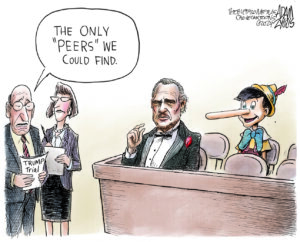VA Attracts Private Firms Pushing Dubious PTSD Treatments
As the Department of Veterans Affairs attempts to address a mental health care crisis, top officials warn of medical claims "made falsely, with ill intent." Alex Proimos / Flickr
Alex Proimos / Flickr
After Wisconsin beer mogul Jake Leinenkugel was tapped by President Donald Trump in 2017 as a White House adviser on veterans’ issues, he quickly identified mental health care as a top priority, alongside privatization of services.
That combination has touched off a behind-the-scenes race by private companies, some offering questionable – or at least unproven – treatments for the signature injury of modern war: post-traumatic stress disorder.
In a small ballroom in the basement of the JW Marriott hotel in Washington, five senior VA doctors expressed some openness to private options – but with clear limits. All fiercely defended the VA’s current approach to mental health care and cautioned against widely adopting any unproven treatments. Last week, various alternative treatments were discussed at a hearing of the Creating Options for Veterans’ Expedited Recovery Commission – also known as the COVER Commission – with Leinenkugel as chairman.
The body’s charter is to study the Department of Veterans Affairs’ own model for prioritizing evidence-based therapy and assess the “potential benefits of incorporating complementary and integrative health treatments available in non-Department facilities.”
The acting assistant deputy undersecretary for health for patient care services, Dr. Marsden McGuire, warned against “quackery” and medical claims “made falsely, with ill intent.” He said he’s received complaints from VA psychiatrists who have been urged to adopt dubious treatments. He then recommended that the agency invest its limited resources in those treatments most likely to help.
“There is some concern that if we put out these things as a magic bullet, we will redirect attention from things that actually have stronger evidence, that are going to work,” McGuire said.
Alternative treatments include simple, less costly approaches such as yoga and acupuncture, as well as more expensive treatments with complicated names, such as hyperbaric oxygen therapy, in which patients are placed in pressurized tubes that deliver high levels of oxygen to the body, and magnetic resonance therapy, a “brain zapping” technique that uses magnets to influence the movement of protons in the cortex.
Private providers are offering effective and conventional mental health treatments as a triage force in what has become an urgent suicide crisis among veterans, with roughly 20 former service members taking their own lives every day.
Amid these emergency conditions, some VA officials and veterans advocates are pushing for wider adoption of experimental treatments, arguing that no veteran should be denied therapy that could potentially help treat mental illness or lessen trauma.
Yet others see these private interests as profit seekers, snake-oil salesmen or pill peddlers eager to bring veterans into a private system in which oversight is lax, PTSD expertise is thin and familiarity with military culture is limited.
While many of these organizations work outside the VA entirely, others are aggressively engaged with the agency in an attempt to peel off patients directly through a partnership or to secure research money, pilot programs or an agency stamp of approval.
Dr. Matthew Friedman, a clinical psychiatrist and one of the founders of the VA’s National Center for PTSD, said he’s recently witnessed an uptick in “self-proclaimed magicians” who are eager to partner with the agency:
The answer is: If it hasn’t been proven, it’s not something the VA should endorse. They should live by the same rules other treatments live by; they should be tested in rigorous, randomized clinical trials. That’s the coin of the realm. And if they haven’t done that … stay away, baby. Stay away.
In June 2017, Leinenkugel sent an email to VA leadership with the subject line “Big Bold Ideas.” His proposals included cutting back staff at the agency’s central office by 35 percent, merging all homelessness programs for veterans into the U.S. Department of Housing and Urban Development, and ramping up suicide prevention efforts.
In this mental health care offensive, Leinenkugel urged the VA to “invite best private care entities to fully participate.”
At the first COVER Commission meeting in late July, Leinenkugel vouched for hyperbaric treatment, saying his support came after two groups spent a year lobbying him on its benefits:
They’re gaining resonance on the Hill and also in states. So whether or not we think that treatment works or has any evidence base to it at this point in time, it is not relevant to me. I think it needs to be explored.
Despite positive anecdotal results, hyperbaric treatment for PTSD has been debunked by several studies, including one by the VA and Department of Defense that deemed it ineffective. In recent years, various interests have sought federal reimbursement for hyperbaric PTSD treatment, including the Princeton Wound Care Center, Healogics and the International Hyperbaric Medical Association.
A COVER commissioner, Tom Beeman, is the executive in residence at the Pennsylvania College of Health Sciences, affiliated with the University of Pennsylvania Health System, which boasts one of the most comprehensive hyperbaric programs in the nation.
“VA would not likely buy a lot of hyperbaric equipment, but instead send people to use it in the private sector,” said a senior congressional staffer who was not authorized to speak with the press. “The VA represents a potentially big revenue stream for private interests.”
The COVER Commission states in its charter that all members must be “of recognized standing and distinction within the medical community with a background in treating mental health.”
Yet at least four members, including Leinenkugel, don’t meet these requirements, which has alarmed some mental health advocates. Some also are concerned that Casin Spero, a former official at the Koch brothers-backed Concerned Veterans for America, recently was appointed as the commission’s chief adviser.
That organization advocates for more private options for VA patients, and organization officials helped craft the Veterans Empowerment Act, a bill that calls for the “termination of functions of the Veterans Health Administration directly related to the furnishing of hospital care, medical services, and other health care.”
Other actors, including executives from major private health care companies, are expected to offer advisory roles as the commission moves forward.
At the start of last week’s meeting, Leinenkugel stated his desire to be an “actionable committee” with the mission of influencing the VA, White House and Congress to make the “necessary and right changes” to the VA’s mental health care efforts. The VA and the White House did not respond to questions submitted by Reveal from The Center for Investigative Reporting.
Your support matters…Independent journalism is under threat and overshadowed by heavily funded mainstream media.
You can help level the playing field. Become a member.
Your tax-deductible contribution keeps us digging beneath the headlines to give you thought-provoking, investigative reporting and analysis that unearths what's really happening- without compromise.
Give today to support our courageous, independent journalists.






You need to be a supporter to comment.
There are currently no responses to this article.
Be the first to respond.